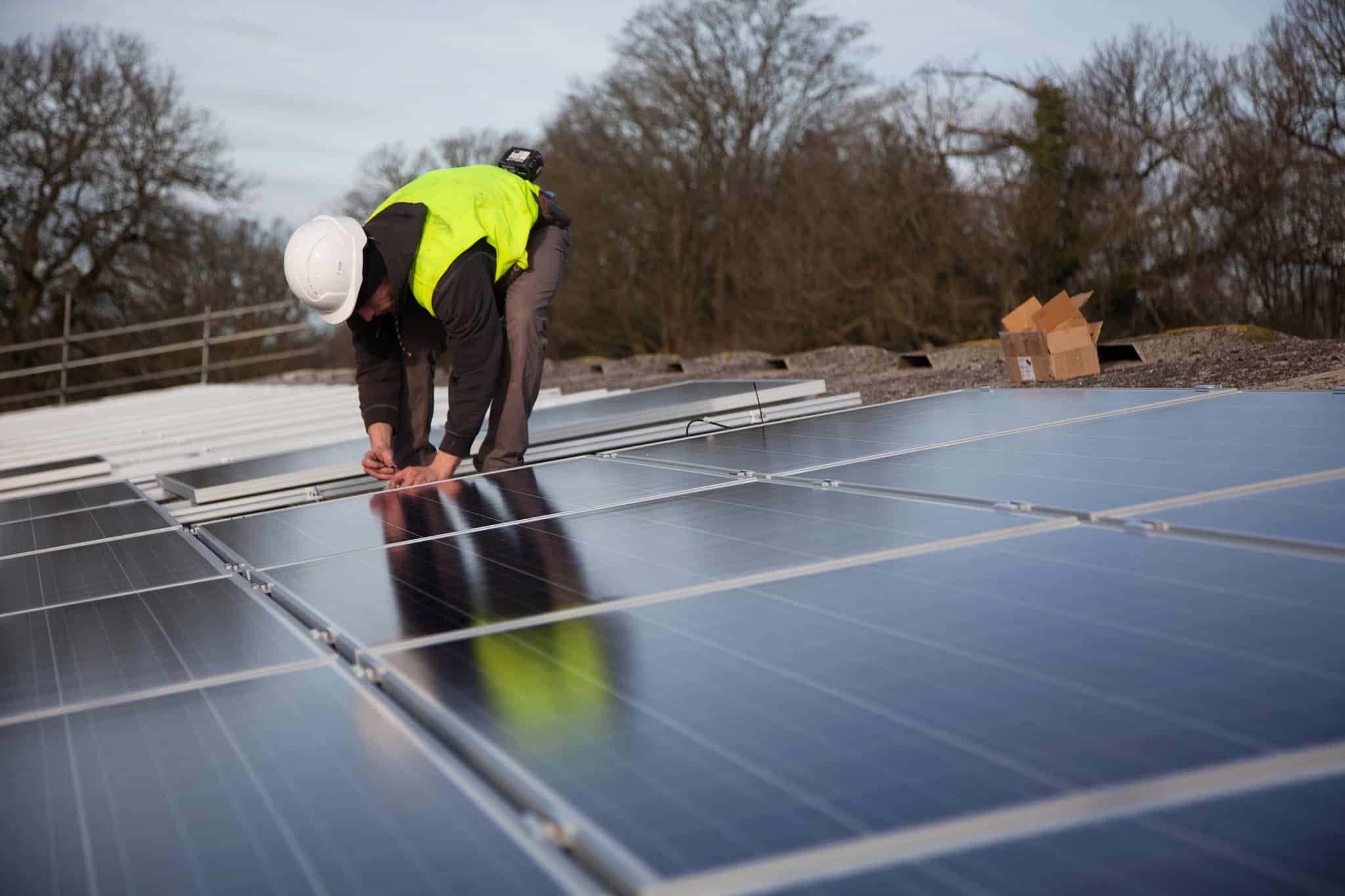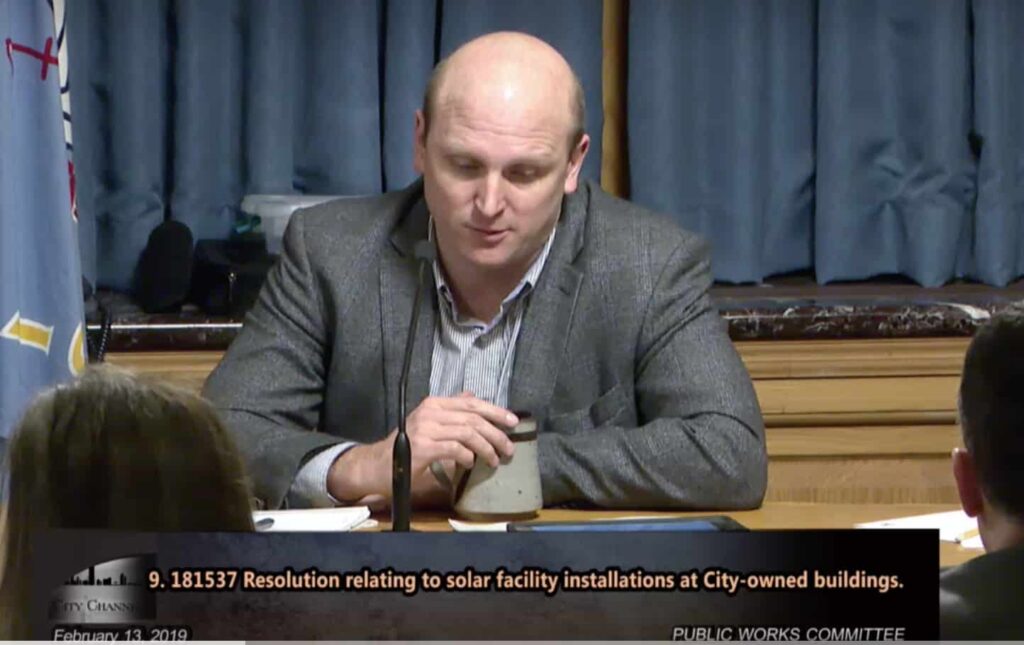City of Milwaukee invests in its own solar, rejects We Energies’ offer for now as councilors express ire with utility’s efforts to stifle market

Milwaukee’s Public Works Committee advanced a resolution yesterday to construct up to .21 megawatts of solar systems on three of the city’s libraries, rebuffing efforts by the monopoly utility company We Energies to be the city’s sole option when it comes to using solar power. The committee’s approval came after months of efforts by city officials to turn to the open market for much larger solar investments that We Energies has blocked at every turn.
Milwaukee’s feud with the $23 billion utility that calls it home began last fall, when the City attempted to partner with a private solar installer, Eagle Point Solar, to connect approximately 1 megawatt of solar systems on its public buildings to the grid. We Energies denied the third-party ownership interconnection requests, citing a Wisconsin law that bans anyone other than monopoly utilities from “providing retail electric service,” which We Energies claimed Eagle Point would be doing.
In it’s denial letter refusing to connect the solar systems, the utility instead suggested that Milwaukee join its Solar Now Program. That program would allow the city to lease its rooftops to the utility in exchange for fixed payments after the company installs its own solar panels. The solar panels would be “in front of the meter(s),” meaning Milwaukee would not get to reduce the amount of electricity it buys from We Energies and to save money from that reduction. Another offering from the utility would provide the City with the ability to receive energy credits from off-site utility-scale solar projects that We Energies would build.
The resolution, which also says the City will “carefully review and consider” We Energies’ Solar Now Program, needs to be approved by the full Common Council when it meets on February 26.
Councilors express frustration with We Energies
At a January 23 Milwaukee Public Works Committee meeting, council members expressed frustration with the Mayor’s office, We Energies’ interconnection denials and the Solar Now Program counter-offer.
Alderman Robert Bauman said, “Hell will freeze over before I vote for doing business with We Energies.”
“You can’t simultaneously misread the law, cynically block something, and it turns out they had a conflict of interest the whole time,” added Alderman Nicholas Kovac. “On this deal, we have a real problem with We Energies, we’re probably going to win but it might take us a few years though, and in the meantime, these solar panels are going to get moved.”
Frustration was again on display at the February 13 committee meeting as members voiced displeasure that We Energies is refusing to allow the City to turn to other providers that would save it more money for its rooftop solar installations.
Kovac said, “We have a monopoly utility acting illegally, but it is going to take us two years to prove they’re acting illegally. But I want to be very clear of the situation we are in is because of a deliberate misinterpretation of the law by a monopoly utility. They have myriad conflicts of interests, one of which we didn’t even realize they had which is they magically invented a solar program in the midst of stopping solar from happening.”
We Energies relies on legal grey area to block city from solar deal
In a typical third-party solar power purchase, a private solar installer like Eagle Point owns the solar panels themselves, but the electricity goes to the buildings of the customer.
The third-party ownership model has been especially important for public entities like cities and school districts, since they do not pay taxes but can’t take advantage of federal or state tax credits for solar power. In the third-party ownership model, the private installer gets those tax credits and passes them onto the customer as savings.
Wisconsin, however, is one of 15 states where third-party ownership is in a legal grey area, according to the DSIRE database, a project of the NC Clean Energy Technology Center and Department of Energy. Nine states explicitly ban the practice, mostly in the Southeast where monopoly electric utilities have used their political clout to prevent changes to the law. Twenty-six states, Washington D.C. and Puerto Rico explicitly allow third-party solar ownership.
In 2014, the Supreme Court in Iowa, another state where the legality of third-party solar had been unclear, ruled in favor of Eagle Point and the Environmental Law & Policy Center and allowed the solar company to own, install, operate, and maintain on-site solar systems at city-owned buildings under a power purchase agreement.
Eagle Point president Barry Shear has said he plans to file a petition with the Wisconsin Public Service Commission, and potentially go to court in Wisconsin, as the company did in Iowa.
“He already won in Iowa on the exact same grounds,” Kovac said of Shear and Eagle Point at the committee meeting. “Do you wait two years for us to embarrass you in court? Obviously, they’ve made a very cynical calculation that in those two years they can corner the market. Obviously, they’ve read their Carnegie and their Rockefeller history well. They are trying to force out all competition so they can control this …”
“There is room for them in this market. But before we begin serious negotiations with them, they need to get out of the way of this deal, and I expressed that sentiment to the Mayor yesterday.”

Councilor: We Energies’ potential support of Milwaukee bid for 2020 DNC creates conflict of interest for mayor
Ald. Bauman told the Energy and Policy Institute that Mayor Tom Barrett has been determined to get Milwaukee to do business with We Energies, rather than pursuing other solar options, despite the fact that they could save the city more money.
“He wants us to approve a letter of intent with We Energies committing to the We Energies Solar Now program even though no analysis has been done, so far as I know, on the costs and benefits of the program nor the long term implications for solar development generally.”
Bauman further said that he suspects that this is because of the upcoming election season and “the prospect of Milwaukee being awarded the Democratic National Convention in July 2020 – an event that will require substantial private sponsorship from corporate interests such as We Energies. We have no direct evidence of this but the inference is reasonable given the speed at which the mayor wants to move and the total lack of due diligence so far.”
There is precedent for monopoly utilities bankrolling their home cities’ presidential party conventions. In 2012, Duke Energy’s then-CEO Jim Rogers co-chaired the DNC non-profit host committee, and the utility ended up forgiving the DNC’s $10 million line of credit that Duke Energy contributed to help fund the event.
On January 23, Mayor Barrett announced that a line of credit has been issued for a possible 2020 DNC, noting that We Energies “has been engaged in the process.” Milwaukee is competing with Miami and Houston to host the DNC.
Bauman said these types of events are a problem. “The cost is huge and government does not have the resources to underwrite this cost. We end up approaching major corporations and to a lesser extent foundations to provide the funding. There are often strings attached whether explicit or more likely implicit.”
Third-Party lease docket rejected by the PSC
As the City of Milwaukee debates how it can finance solar projects, residential customers in the state also continue to wait for the issue of third-party leases to be decided. The PSC voted 2-1 earlier this month to prevent a docket from being opened to explore the issue of third-party leasing.
The petition was brought by Sunrun, which recently received approval by the Florida PSC to offer 20-year solar leases. The Florida PSC determined that a 20-year lease on solar energy does not make Sunrun a public utility. The Wisconsin PSC argued that the legislature should decide if this type of lease would make Sunrun a public utility in the state.
Photo credit: Flickr. https://www.flickr.com/photos/tentenuk/16200926468



